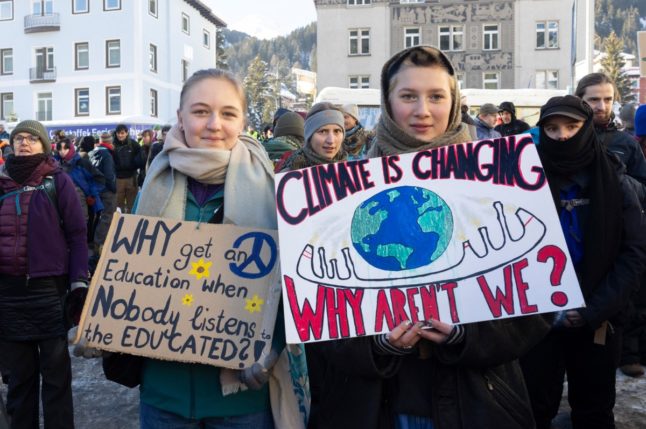On April 28th, in his first State of the Union address as US president, Joe Biden referred to Switzerland as a “tax haven”.
His exact words were: “A lot of companies also evade taxes through tax havens in Switzerland and Bermuda and the Cayman Islands”.
The comment took Swiss authorities by surprise, especially since, as Finance Minister Ueli Maurer pointed out in an interview, Switzerland “fully respects all its international obligations and is very transparent”.
“I don’t think that’s the position of the US government, but the speech writers didn’t know the real facts”, he added.
What are ‘the real facts’?
It is perhaps not surprising, given its long history of banking secrecy, that Switzerland is sometimes still perceived as a place where rich people park their money to avoid paying taxes in their own countries.
This was brought to light again with the recent publication of “Pandora Papers” — about 12 million leaked documents revealing the shady financial dealings of some of the world’s richest and most powerful individuals.
While many countries were implicated, in Switzerland 90 tax, legal, and consulting firms were found to be involved as well.
Additionally, another source, a Lausanne-based NGO Public Eye, also revealed recently that Swiss lawyers and trustees continue to create “shell” corporations.
These “letterbox companies”, active mostly in finance, real estate or commodity trading, are registered in “ghost” buildings, where law firms and trustees administer day-to-day affairs and telephones are answered by a concierge service.
Have your say: What are the best banks for foreigners in Switzerland?
The Public Eye survey reveals that nearly 33,000 companies that exist only on paper are based in the cantons of Geneva, Zug, Fribourg and Ticino.
These companies are not necessarily engaged in illegal activities but this type of arrangement is most often used to conceal questionable transactions and is responsible for almost half of suspicions of corruption and money laundering transmitted to the Swiss authorities, the NGO found.
How has Switzerland become known as a tax haven in the first place?
Switzerland is the largest offshore wealth manager in the world, handling a quarter of all cross-border assets, amounting to nearly 8 trillion francs.
Providing financial services is not illegal in itself, as long as this is done in accordance with Swiss and international laws.
But for decades, Swiss banks used (or, rather, misused) the country’s banking secrecy law, first introduced in 1934, to stash undeclared money in banks, “dummy” corporations, and trusts created especially to hide these assets.
Because of these practices, Switzerland became known as a tax haven – or a fiscal paradise – where wealthy people from around the world hide their money.
However, this started to change in 1998, when the Swiss began to clean up their act, at least in part due to international pressure.
Legislation passed that year made money laundering illegal, while other laws require that any suspicious deposits be reported to the authorities.
Then, in 2011, another regulation was passed, allowing the government to confiscate funds deposited in Switzerland by plundering dictators and return the money to the country of origin.
READ MORE: Why Switzerland is no longer the tax haven it used to be
And since 2017, Swiss banks have been practising automatic exchange of information with their foreign counterparts. The goal is to ensure tax transparency between countries, which basically laid the notion of banking secrecy to rest.
So is Switzerland a tax haven or not?
The Global Financial Regulation, Transparency, and Compliance Index by the Swiss Banking Institute analysed 31 countries which are members of both the Organisation of Economic Cooperation and Development (OECD) and Basel Committee on Banking Supervision (BCBS).
It placed Switzerland in “the top-ranked group” in terms of compliance with international banking regulations in 2020 and 2021.
Also, Switzerland was removed from the EU’s list of tax havens in 2019 (after two years on it) because that year Swiss voters accepted a legislation which introduced major changes in the Swiss tax system by ending some preferential tax schemes and replacing them with new regulations which are in line with international standards.
What do the experts say?
Tax experts in Switzerland may argue over the specific definition of ‘tax haven’, but they tend to agree that Switzerland doesn’t fit the bill.
Government experts sought to reinforce that while Switzerland maintained a competitive investment environment, it was not a ‘tax haven’.
“No, Switzerland is not a tax haven, but an attractive business location”, said Frank Wettstein, spokesperson for the State Secretariat for International Finance.
Wettstein highlighted Switzerland’s compliance with all international tax policy standards, in line with the rating afforded by the Swiss Banking Institute (listed above).
“The main reason Switzerland is still sometimes called a ‘tax haven’ may be its moderate tax rates in comparison with many competitors. This tax regime is mainly due to Switzerland’s traditionally prudent fiscal and expenditure policies”.
This means that the federal government must balance finances over the long term, thus limiting excessive expenditures, public debt and tax increases.
This “debt brake” has been very effective over the recent past when debt levels and tax rates increased in many other countries, Wettstein pointed out.
“Today, Switzerland supports ongoing international efforts to achieve greater transparency and a level playing field with regard to the taxation of multinationals”, he added.
Daniel Warner, former deputy to the director of The Graduate Institute of International and Development Studies in Geneva, noted that “Switzerland is not a fiscal paradise. That’s too strong a term”.
He concedes, however, that “there are still loopholes”.
“Where due diligence and transparency have been expanded and international cooperation increased, there remain places in Swiss law that could be tightened,” Warner told The Local.
For Francesca Amaddeo, international tax expert at the University of Applied Sciences and Arts of Southern Switzerland, Switzerland couldn’t be described as a tax haven – either now or at any time historically.
“Defining Switzerland as a tax haven has always been debatable. Switzerland has never been a tax haven, which means a jurisdiction with a low or zero tax rate,” Amaddeo told The Local.
While the attractiveness of Switzerland financial marketplace and strong bank secrecy may have brought in some illicit funds in the past, Amaddeo said that “nowadays, Switzerland responds positively” to international regulations.
However, despite all the efforts made, Switzerland is still seen with mistrust, Amaddeo noted.
“For instance, if one looks at the Corporate Tax Haven Index, listed by the Tax Justice Network, Switzerland is still ranked in third place. Such an evaluation seems to ignore all tax reforms and changes implemented in the country”.
Regarding Pandora Papers, “the disclosed offshore structures are more American than Swiss”, she pointed out.
Therefore, the experts believe that Switzerland’s classification as a tax haven comes largely from an unearned reputation, rather than anything specific in current tax policy.
What does this mean for me?
Generally speaking, this is unlikely to make a significant and direct difference in the life of individual people on average incomes in Switzerland.
In recent years however, Switzerland’s compliance with international financial norms has made life a little more difficult for Americans living in the Alpine nation, many of whom have been unable to open a bank account due to US financial rules.
READ MORE: Why are Americans being turned away from Swiss banks?
The most important among these rules is the Foreign Account Tax Compliance Act (FATCA), which was passed by Congress in 2010 and went into effect on January 1st, 2014. It requires foreign banks to report to US tax authorities (IRS) all the assets that belong to US citizens – whether living in America or abroad.
As we looked into in our report into banks for Americans in Switzerland, while it is more difficult for Americans looking to open an account, it is far from impossible.
Click the link below to get an overview of the best banks for Americans who live in Switzerland.



 Please whitelist us to continue reading.
Please whitelist us to continue reading.
Member comments